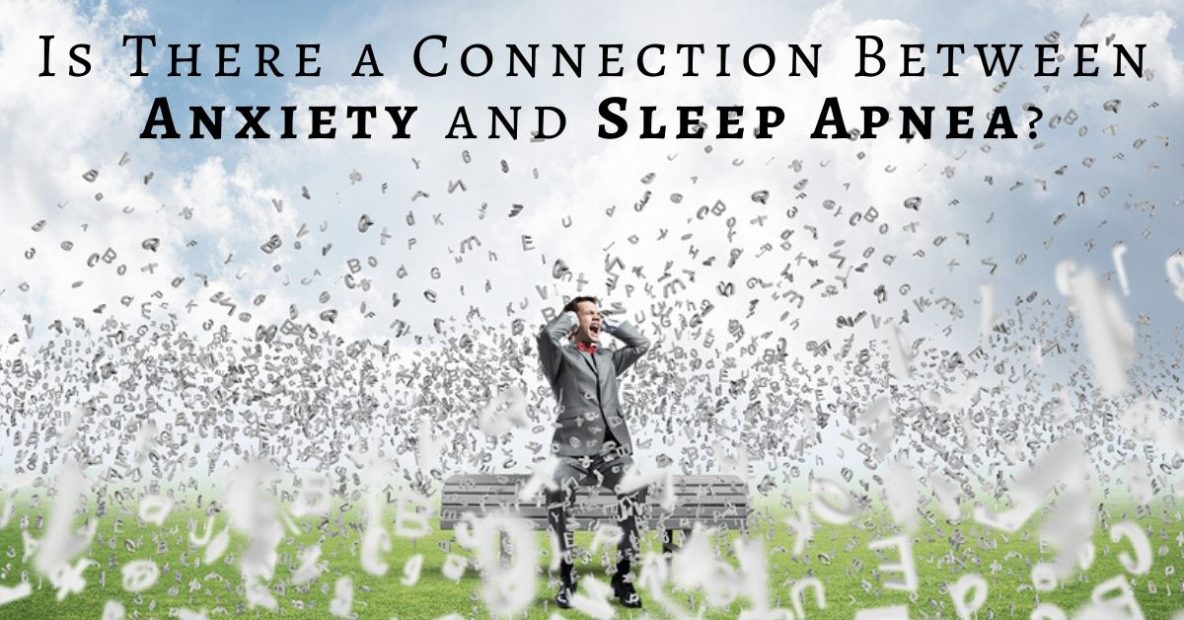Is There a Connection Between Anxiety and Sleep Apnea?

- A Promising Paradigm Shift: New Research Challenges the CPAP-First Approach to OSA Treatment - September 5, 2023
- Understanding Sleep Meditation Techniques - July 30, 2021
- How Online Learning Has Affected Sleep for Students - July 13, 2021
Sleep apnea is a common condition among American adults. During sleep the upper airway over-relaxes, closing the throat and stopping the flow of air and oxygen. You will repeatedly wake up throughout the night to restart your breathing. Many people with sleep apnea have never been diagnosed, and this can lead to serious physical and mental problems.
Identifying Sleep Apnea
Not only does sleep apnea affect your ability to get a good night’s sleep, if you have this sleep disorder, you’ll experience a lot of other negative health outcomes. Sleep Apnea can cause insomnia, fatigue, trouble focusing, headaches, and extreme drowsiness during the day. If you have sleep apnea, you’ll start to feel irritable and moody, and adults suffering from a sleep disorder are far more likely to be diagnosed with depression or anxiety.
The physical effects of sleep apnea can include irregular heart patterns and dangerously high blood pressure. You may experience excessive sweating, rapid breathing or hyperventilation, chest pain, and struggling with unwanted and distressing thoughts.
What is Anxiety?
Anxiety, at its most fundamental level, is your body’s response to stress. Anxiety can often be seen in distracted thoughts, negative thought patterns, physical tension, and even high blood pressure and an increased heart rate. If you’re battling anxiety, you may also have insomnia, and your thoughts will keep you up at night.
Is There a Connection Between Anxiety and Sleep Apnea?
Since both sleep apnea and anxiety are closely linked to sleep, it’s not hard to imagine a connection between the two. When you stop breathing during a sleep apnea episode, your body goes into a state of stress and panic, signaling to the brain that the flow of air and oxygen has stopped. This triggers the brain to waking up the body and resume breathing. While this is a healthy reaction that restarts your breathing, it also induces a state of panic and anxiety in the body. Episodes of sleep apnea can occur more than 30 times per hour all through the night, and during the night you won’t be able to sleep deeply or relax.
When your sleep is disrupted over and over again throughout the night, not only will you be tired, but the neurochemical makeup of your brain can shift. You’ll have more cortisol in your brain, leading to increased stress and anxiety, and shifts in your mood and thought patterns. Your body will be in a constant state of anxiety, and you won’t be getting the sleep you need. When you’re sleep deprived, and your body isn’t well rested, you’re less able to effectively cope with the stressors in your life, and you’re far more likely to suffer from anxiety. This is a vicious cycle, and the more anxious you feel, the less you’ll be able to sleep.
Treating Sleep Apnea and Anxiety
Sleep Apnea and Anxiety are closely linked, and sleep apnea can cause anxiety. Anxiety heightens your experience of sleep apnea, but doesn’t directly lead to sleep apnea, so anxiety and sleep apnea should be treated separately.
The best treatment option for sleep apnea is a continuous positive air pressure (CPAP) machine. This small machine sits beside your bed, and is connected to a face mask. When you wear this mask during the night, you’ll have a small flow of air through your lungs, keeping your airway open, and allowing you to sleep deeply without waking up. When you’re able to get a full night of deep sleep, your body can start to recover. You’ll have less cortisol in your brain, and you won’t feel so fatigued. You won’t struggle with moodiness, and your anxiety will decrease.
If you continue to suffer from anxiety after you’ve treated your sleep apnea, visit your doctor to find a treatment option that will reduce your stress and anxiety, and allow you to enjoy a stress-free life.
Sound Sleep Medical
If you’ve been suffering from sleep apnea or anxiety, visit us at sound sleep medical to find the best treatment option for you. A comprehensive sleep study will analyze your sleep patterns, heart rate, airflow, and oxygen levels during the night, and determine what treatment option will help you sleep deeply. Don’t let sleep apnea hold you back, and find your way back to deep sleep.
